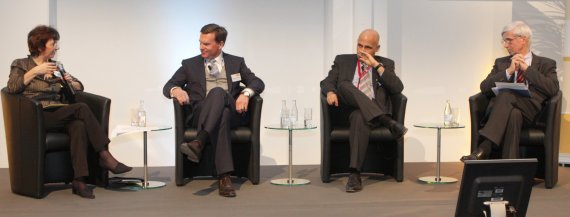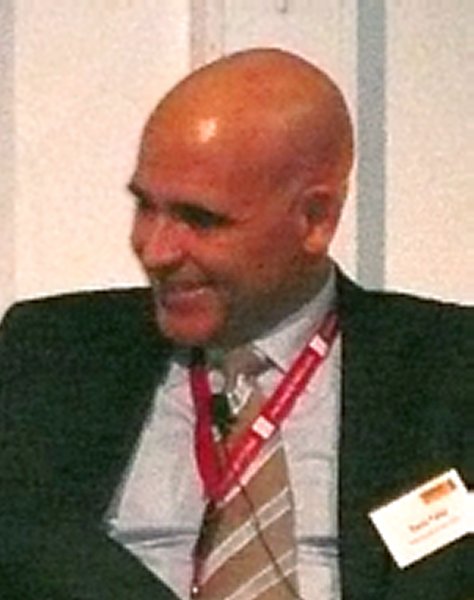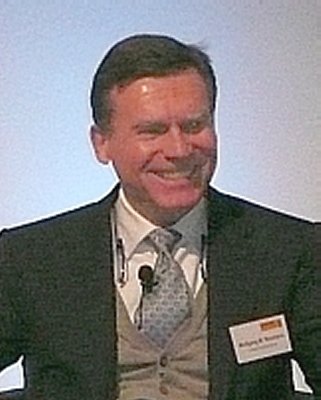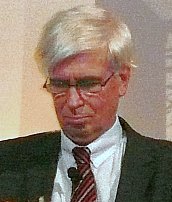CEO Panel at 5th ITB Hospitality Day: Why Wolfgang Neumann and David Fattal prefer expanding in difficult Western Europe
 |
|
| Moderator Maria Puetz-Willems talking to Wolfgang Neumann, David Fattal and Matthias Schroeder (from left). |
Berlin (March 19, 2010). One of them "discovered" Germany and the neighbouring countries as an ideal expansion field, the other one is concentrating again on this region. Nevertheless, David Fattal of Fattal Group/Leonardo Hotels, Tel Aviv/Berlin, and Wolfgang Neumann of Arabella Hospitality Group, Munich, have different motives. Both are managing hotel businesses, whose histories are firmly entwined with the real estate; however, their strategies are different in essential points. During the "CEO Panel" at the 5th "ITB Hospitality Day" last week in Berlin, host Maria Puetz-Willems and certified accountant Matthias Schroeder were able to obtain more details.
David Fattal, Founder and CEO of Fattal Group and the hotel chain Leonardo Hotels, and Wolfgang M. Neumann, CEO of Arabella Hospitality Group, have many things in common. Fattal, whose empire today comprises 60 hotels in Israel, Germany, Belgium and Switzerland, got to know the hotel industry when he worked at the reception desk of a hotel in Haifa as a student. "Back then, I got infected by the hotel virus and have not been able to get rid of it since," he says.
 |
|
| David Fattal. |
Wolfgang Neumann from Austria, with a classical hotel education in Austria and abroad, has been participating in the highest class of the chain hotel industry in Europe for many years. He was at the Hilton for many years; for one year now, he has been working for the Arabella Hospitality Group, a branch of the Schoerghuber business group from Munich. It manages 41 hotels in a joint venture with Starwood Hotels & Resorts.
Both men not only have a passion for the industry but also a preference for entrepreneurial independency. "I brought the brand Holiday Inn to Israel and managed ten Holiday Inn hotels, then I founded my own business," says Fattal. And Wolfgang Neumann emphasises: "The Schoerghuber business has an enormous platform where you are able to operate individually."
Germany as core market
The German hotel market was the springboard for Fattal and for Arabella into the European hotel industry. Extending his commitment to Germany in 2007 is something David Fattal has never regretted: "We wanted to expand to a country with the same economic language and not to a country where the property relations are unclear," he explains. "Germany is of great economic significance, and as it is positioned between east and west, it is an important market and location". However, he also considered England or Paris for expansions. "But, there, the investment rates per hotel room were out of proportion." In Germany, I was able to purchase real estate in large cities whose room rates did not exceed 100,000 euros. From the real estate point of view, the yield is good," says Fattal.
Fattal and Neumann are surprised why the Germans constantly complain about their own market. "ROI is very low in countries where real estate is expensive. Germany is a very solid market with a good economy and motivated people. In future, we want to expand to German-speaking countries," emphasised Fattal. He is more disappointed by his Belgian partners. He manages six hotels in Belgium; however, it is very difficult.
 |
|
| Wolfgang M. Neumann. |
Neumann: "The country is well positioned, Germany is a powerhouse. The training is very good as well. The Germans should stop complaining. Where is it easy to make money in the hotel industry nowadays?" he said questioningly.
Hotel operator or real estate vendor
Both businesses, Schoerghuber and Fattal, have their roots in the real estate sector. Fattal splits the business sectors hotel operation and real estate between Israel and Europe, due to tax reasons. Arabella Hospitality Group has lease and management businesses and owns shares of the marketing cooperation Design Hotels. About two thirds of the hotel real properties are owned.
The trade with hotel real properties is not important for Arabella. Neumann: "Asset light might be the right thing for the big ones. We recently sold off our hotels in South Africa because we only wanted to concentrate on the core business with the hotel business. We have no energy left to expand the market further there."
On the other hand, Fattal still sees it as a little thorn in his side that 45 of the 60 hotels are in ownership. "In future, we would like to sell the real estate; however, we are still young. My aim would be: one third property, one third lease, and one third management," he emphasises. And the subject of franchising is one thing Fattal wants to realise in future (he officially announced it at the ITB). Now, he is also offering private hotel managers to join his brand Leonardo Hotels in Germany, Belgium, Italy and the Netherlands as franchisees. According to Leonardo, interested franchisees will profit from the internationally recognised name Leonardo Hotels as well as the extensive sales, marketing and PR activities, the well thought-out and simple booking system, and the successfully experienced Leonardo Hotels process management system.
 |
|
| Matthias Schroeder. |
The lease agreement is decisive
In Berlin, the independent certified accountant Matthias Schroeder of SIH, Structured Information Hotel, presented the top managers and panel participants with the figures of a fictitious 250-room first-class hotel. The figures revealed a yield of 6 percent in good times and 4.1 percent in bad times. "The good example seems to be familiar," said Fattal dryly; however, he confessed that he had lost some money with the four to five lease agreements last year in Germany, and Munich too, and the ones in Israel.
Wolfgang Neumann supported him: "The entire life cycle of a hotel has to be taken into consideration. Last year, there was a rate decline of 16 percent and a decrease in occupancy of 5 percent," he explained and commented on the example hotel: "This hotel has not been managed well." At the end of the day, the lease agreement decides, and this will be the big challenge in 2013 in particular. As then the switching from "financial lease" to "operating lease" will take place and leases have to be accounted for in the balance sheets. "The hotel landscape in Germany will change dramatically because of this," says Neumann. "We are still not sure about the consequences; it is a time bomb. Lease agreements will be put under a lot of pressure. The typical Germany lease model will become extinct."
Brands against the internet
Fattal and Neumann have different opinions concerning "brand attachment". Whereas Fattal regards his own brand as franchise capable, Neumann works on a joint venture with the introduced Starwood brands, such as Sheraton, Westin, Four Points by Sheraton or The Luxury Collection. "I know how big chains operate. Loyalty programmes are able to move a lot," he explains. Fattal, however, is convinced that brands lost their importance with the internet revolution. "Doing business via the internet is totally different. Today, small businesses invest much more into new media than big ones," he emphasises. "Being small has many advantages. Our business is very fast, which does not work so well with the big ones."
Neumann thinks he is partially right. "Brand awareness is changing. 42 percent of the turnover is generated over own channels. Flexibility is trump," he says. "Niche products and smaller brands are able to be more personal. In future, there will be a focus on volume hotels and niche markets." Therefore, a successful hotel chain manager will not be able to manage a design hotel.
Concerning the budget market, Neumann and Fattal show different interests. Neumann signalled his interest in budget projects; this field is still underdeveloped in Germany. "Personally, I don''t like budget hotels," says Fattal. "Everything is determined by the price. We decided on 3 to 4 stars. Even our product Leonardo Inn still has 3 stars. And for luxury hotels, we are not wealthy enough."
Conclusion: As different the strategies of Arabella Hospitality Group and Fattal Group/Leonardo Hotels are, both businesses will find their way in hotly contested and margin-weak Europe. It will be very interesting observing them. / Susanne Stauss
To print this article you have to be registered and logged in for newsletter, visitor or subscription.





